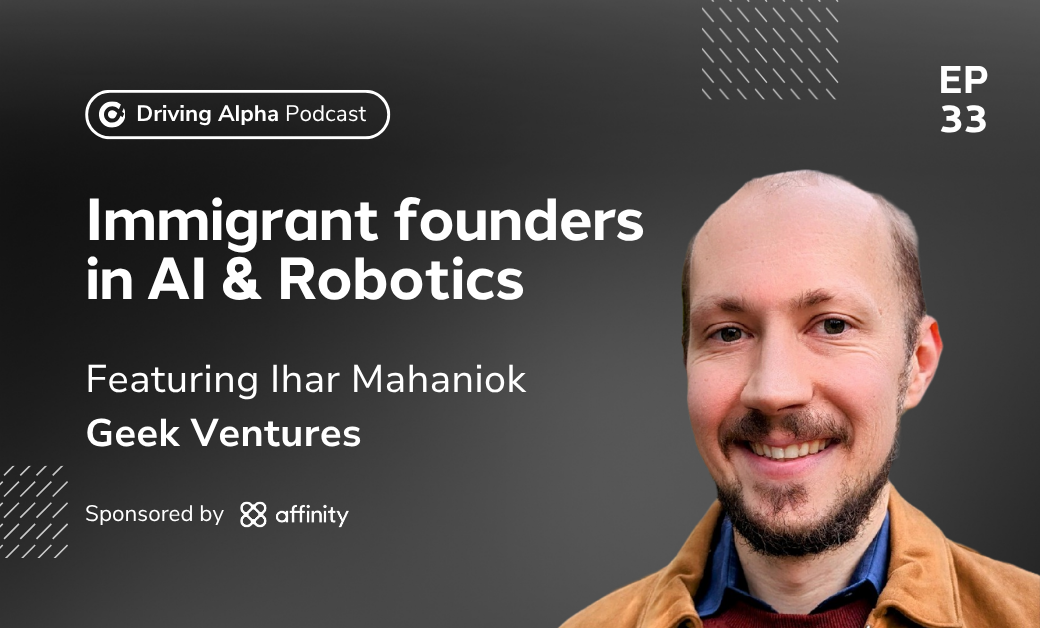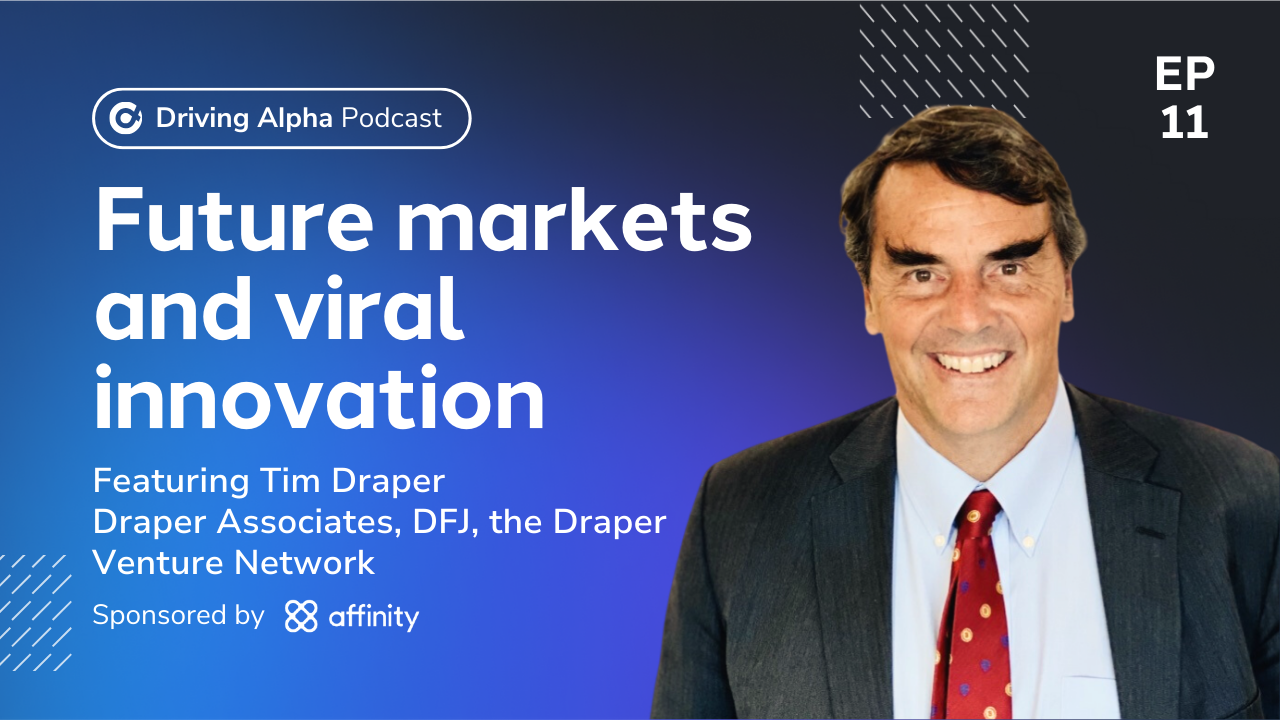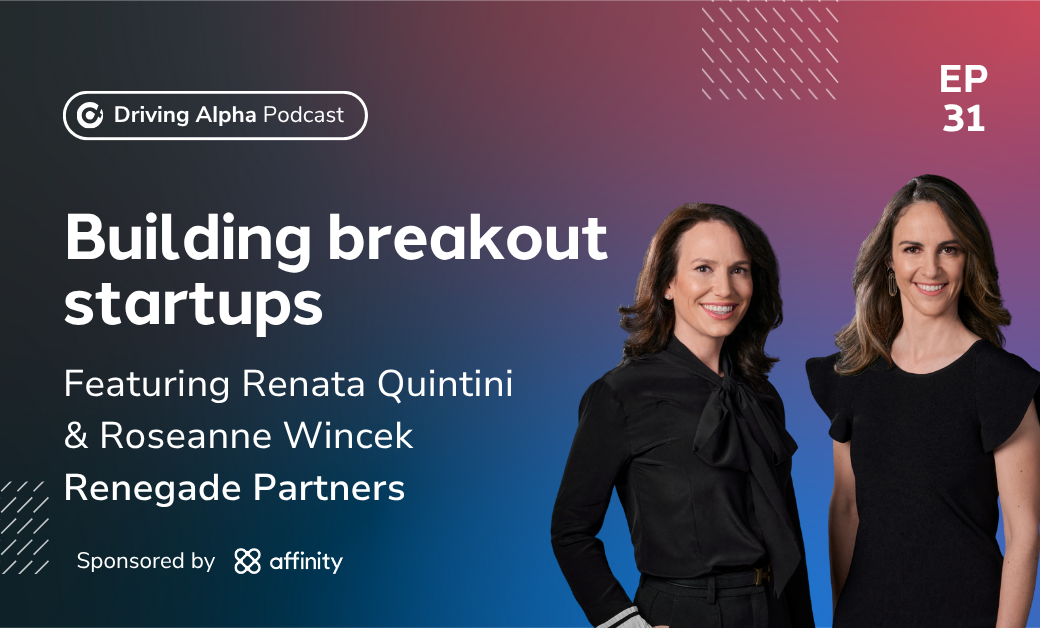Zoe Van Den Bol: Hello everyone, and welcome to the Driving Alpha podcast, where we interview top GPs to talk about how they drive alpha for their founders, their LPs, and the rest of the entrepreneurial ecosystem. I am thrilled today to be joined by Ihar Mahaniok, Founder and Managing Partner at Geek Ventures.
Ihar started coding at only 12 years old and eventually went on to work at tech giants such as Google and Facebook, later serving as the VP of Engineering at Lightning AI, focusing on AI and machine learning. He began angel investing over a decade ago, investing in more than 100 companies, including five unicorns such as Instacart, People.ai, and PandaDoc. In 2021, Ihar launched Geek Ventures, a fund based in New York focused on early-stage immigrant founders building in the AI and robotics space. Geek Ventures aims to drive equal opportunities for these visionary entrepreneurs through capital and connections.
Thank you for joining us, Ihar. Can you please share a little bit more about your journey and what led you to starting Geek Ventures?
Ihar Mahaniok: Thank you very much for inviting me, Zoe, and for giving such a great introduction. I think the most important thing is that I was always in tech, but I was also always interested in both business and technology together. Technology was something that I covered through engineering, through coding, but it was not enough for me.
I went out to conferences since I joined Google, and even before, and met a lot of founders, which led me to build a network and eventually start investing in these companies as an angel investor. After almost a decade of balancing both engineering leadership on one side and investing in companies on the other, I realized I was much more interested in focusing on investing in technology—especially AI and ML—and bringing more opportunity to founders.
One thing I believe in is that talent is distributed evenly, while opportunity is not. With a focus on immigrant founders who are often overlooked and underfunded, we can find amazing, brilliant entrepreneurs destined for huge success, but who still struggle in the beginning to find someone who will believe in them. Often, they are under-connected, not in the right networks—perhaps because they moved recently. All of this inspired me to start Geek Ventures. I’ve been running it for four years now, and it’s something I love doing.
Zoe Van Den Bol: You are an immigrant yourself and have built up a very strong network—strong enough that you can help these other immigrant entrepreneurs. Can you talk more about your background and how you navigated coming to the U.S. and building such a robust network?
Ihar Mahaniok: I moved to the U.S. in 2013 when I was still at Google. I had already pre-built my network before fully moving here because I was part of Google and had been visiting the U.S. for business trips for many years.
When I moved fully to New York, I started from day one to get deeply integrated in the New York angel and venture ecosystem. For example, I joined the angel community called Empire Angels. I started going to a lot of accelerator demo days, trying to be helpful. I became a mentor at several accelerators—ERA, Grand Central Tech, VentureOut. I was invited to judge startups, give advice, and speak on panels.
Through big tech companies like Google and later Facebook, I also tapped into their startup networks through alumni—people who left to start their own companies. I kept in touch with those founders. Naturally, I’m a networker by personality. I was a heavy user of LinkedIn 15 years ago, when many people weren’t. Whenever I went to a conference or event, I made sure to connect with interesting people, follow up, and keep in touch.
I also try to bring value to people—mainly through connections, but also by sharing knowledge. For example, by speaking to so many founders, I saw issues they struggled with and solutions they came up with. The next time I met a startup facing the same problem, I could share those solutions. People valued that.
When people were looking for introductions, I could often connect them to the right person. I also knew about great events and would tell people coming to New York which ones they could attend, especially the hard-to-get-into events.
Zoe Van Den Bol: Got it. And just focusing on that last point—if you’ve built a reputation and network well enough that people from abroad, when they visit New York, come to you—what did it take to get to that point? Was it really just facilitating all these connections? And how do you keep all of this in your head and know who to connect to? Do you have any tips for listeners on how to position themselves as “the connector” people go to?
Ihar Mahaniok: First of all, I know a lot of people who are even better connectors than me, and I don’t claim to be the best. But there are several important things.
I use LinkedIn as my main tool to keep my network and stay in touch. I have a few rules—for example, I don’t accept 90–95% of inbound connection requests. I only accept people I’ve met at least once—whether at an event or on a Zoom call—or people I immediately see I really want to talk with. These are the minority. I have about 5,000 connections on LinkedIn, and I know at least 4,500 of them well enough to have spoken with them at least once.
On the flip side, I create public content on LinkedIn, which I recommend to everyone. That means content that not only my contacts can see but also my followers. LinkedIn has a setting that allows people to follow you, and I think everyone should enable it.
When I create content, people who don’t know me start following me, and people who do know me—who maybe I met once—get to know me better. Without LinkedIn, if we met briefly at a conference, you’d probably forget who I was a year later. But if I keep showing up in your feed every week or month, you remember, “Oh, this is Zoe; she works at Alpha; she invests in these kinds of companies.”
This helps both ways—I remember people too. And this network helped me raise Fund I because I could raise it from people who knew me mostly through LinkedIn. Some hadn’t spoken to me one-on-one for years, but they told me, “I’ve been following you on LinkedIn for years—maybe I’ll invest in your fund.”
Zoe Van Den Bol: Wow, that’s really impressive that you’ve built such a strong online presence and people believe in you enough to invest in Fund I even without recent personal contact. That says a lot about the quality of content you put out.
Switching gears—you’re a great networker and community builder, but you also have an impressive background working at top tech companies like Google and Facebook, and scaled startups as well. How has your engineering background helped you as a GP today?
Ihar Mahaniok: The most important thing is that it sets me apart from most GPs. I only know a couple of other GPs with an engineering background—most have financial or other business backgrounds.
It helps me connect on a different level with technical founders, especially CTOs or very technical CEOs. I can better understand what they’re doing, and they feel they’re talking to someone who “gets it.” This helps me win deals and recognize technical brilliance when there isn’t yet financial traction.
On the flip side, if I meet a non-technical CEO I want to invest in, they can lean on my technical expertise. I’ve helped founders plan and strategize hiring for CTO or VP of Engineering roles because I know what to look for. I couldn’t help hire a CMO, but I can help hire a top technical leader.
Another angle is that I’ve learned a lot from engineers. I pitch to startups that we’re a unique fund with over 100 engineering LPs who are excited to try their solutions. That’s especially appealing for startups building developer tools or needing engineering eyes on their product.
Zoe Van Den Bol: That’s definitely an interesting selling point—especially since you invest early, when connections and feedback are critical. Geek Ventures has a unique approach, backing immigrant founders coming to the U.S. Can you talk about how you find these founders, what qualities you look for, and how you vet them?
Ihar Mahaniok: The best founders are generally those who have gone through adversity—faced tough odds and still won. Immigration is one of those challenges. Choosing to leave where you grew up—your friends, your social circle—and start from scratch elsewhere shows grit, determination, and ambition.
The U.S. is a place for ambitious people; it’s designed to help them succeed. But it’s not easy. Building a network is one of the hardest parts, along with navigating cultural differences. No country is exactly like America. Even moving from Canada to the U.S. comes with differences; moving from Eastern Europe, Africa, Latin America, or Southeast Asia brings even more culture shock.
From an investor’s side, people from different cultures bring fresh perspectives and out-of-the-box thinking. Data shows that a large share of unicorns and Fortune 500 companies are co-founded by immigrants—think of Google, Stripe, SpaceX.
We look for founders who deeply know their market, product, and problem space, and who are passionate—hence the “geek” in Geek Ventures. We want founders committed to building something significant, with the potential to be huge. We invest early, but only in those who believe they can build something big and who show signs of exceptionalism—the top fraction of a percent.
We also want people striving for excellence—building the best product, hiring the best people, and setting high performance standards. And we want founders creating real technology—applying cutting-edge tech to real-world problems. Our sweet spot is where deep tech meets real revenue potential, with strong technical and business minds in the founding team.
Zoe Van Den Bol: Thanks for that overview. When you connect with these immigrant founders, what resources do they usually need the most help with?
Ihar Mahaniok: It comes back to the same thing—network. To succeed, you need multiple components: an amazing product, the ability to sell, strong technology, and the ability to raise capital and connect.
I know there are funds that focus on helping with product-market fit or sales. But the ability to build a great product and sell it is much more innate to a company and harder to “fix.” Networking, on the other hand—who you know—is much easier to improve.
So we focus on lifting the connectivity of founders and improving everything related to fundraising. That’s applicable across sectors. Whether a startup is in healthcare, construction, or dev tools, they all go through the same fundraising process: approaching the same types of VCs, handling the same term sheets.
Unless you’ve been in these circles for a while, you often don’t know the process—angels versus VCs, how to get a lead investor, what to do between leads and followers. We help a lot there. For example, one portfolio company needed to raise a party round, and we connected them to 60 different investors. They converted about 20 of them.
We also help with negotiating term sheets, which is another cultural thing. Founders from outside the U.S. often don’t know how negotiations work here. And even experienced founders might have sold their product many times but negotiated a term sheet only once or twice—or never. So when a new term sheet comes in, they don’t necessarily know what’s right, what’s wrong, or how to approach it.
We’re always on the founder’s side. If we invest early, and for example, a Series A term sheet comes in later, we’ll help. We also invite founders to events and create events for our portfolio and immigrant founder ecosystem. Events are a huge advantage for networking.
Zoe Van Den Bol: For the immigrant founders in your network, what’s usually the biggest culture shock when they start fundraising in the U.S.? Is it negotiating term sheets, the process itself…?
Ihar Mahaniok: The biggest shock I see repeatedly is how difficult it is to deal with the lack of feedback and the “sugar-coating” common in the U.S. It’s a very American thing.
You meet someone, they tell you they like you, they smile—and then they ghost you or politely pass without giving any real feedback. Founders have no idea what went wrong. Some get this treatment dozens or even hundreds of times.
So learning to ask for feedback and to decode the sugar-coating is critical. You need to distinguish between someone genuinely interested and someone who’s just being polite.
On the flip side, founders from cultures with more radical transparency sometimes undersell themselves. They focus too much on the negatives and not enough on the big vision or “rosy” picture. U.S. VCs who aren’t used to that may see it as a lack of confidence or ambition. If I know the founder is capable but just very transparent, I help them adjust their pitch so it lands better with American investors.
Zoe Van Den Bol: You’ve been building and investing in AI for quite some time. With AI now on everyone’s mind, what are some misconceptions you think VCs or the general public have about AI and its possibilities?
Ihar Mahaniok: For the general public, the discussion is often too black-and-white—either “AI is useless” or “AI can do everything.” In reality, AI is a tool. Its emergence is a new era—similar to the rise of the internet, mobile, or cloud computing. That’s why we’re focusing on AI right now—it’s incredibly important.
I don’t believe AI will replace everything overnight. It will replace a lot, and it will change many jobs, but it will also create new jobs—jobs that wouldn’t exist without AI.
Another misconception is about valuation. People read in the media about a company raising a $2B seed round at a $10B valuation with nothing built yet, and they think, “AI is overpriced.” But there are tens of thousands of AI companies priced like SaaS companies were ten years ago—sometimes only 50% higher, which barely adjusts for inflation. Early-stage AI is not overpriced.
Also, AI enables companies to grow faster—getting to revenue and product readiness much quicker than before. Ten years ago, a software company might go years without revenue; now, there’s no excuse for that.
When we invest, we want complexity that’s hard to replicate, but we’re also looking beyond the tech itself. Software is easier to rewrite now. So we look for product-market fit, customer understanding, data moats, network effects, and lock-in—moats beyond just technology.
Zoe Van Den Bol: That’s something we talk about as a fund, too. We’re also looking to invest in AI companies—just at a slightly later stage than you. The biggest question we have is about long-term sustainable moats. It’s relatively easy to build the tech, but it’s the ecosystem, the channel partners, the customer stickiness, and the data that matter more.
Ihar Mahaniok: Exactly. And I’ll add something: we’re entering an era where we’ll have far more unicorns than before. The word “unicorn” used to mean something rare, but by 2030 we could have tens of thousands of billion-dollar companies.
Many will be in the single-billion range—it will still be harder to build a $10B company. But the combination of factors—globalization, easier access to customers worldwide, and AI accelerating product and sales—will make it much easier to build companies with $100M–$200M ARR, which often equates to a billion-dollar valuation. We’re still in the very early days of this.
Zoe Van Den Bol: That will be interesting to see. The growth of some companies reaching hundreds of millions in ARR faster than past SaaS benchmarks is exciting—especially in markets big enough to support it.
In our earlier conversation, we talked about the makeup of teams at AI startups. Historically, if you had 20 employees, you were seen as doing well. Now, it’s flipped—if you get to scale with five people, that’s impressive. You’ve been a hiring manager at both startups and big tech—why do you think smaller teams are better now?
Ihar Mahaniok: This has changed a lot in the past 3–4 years. Success used to be correlated with headcount. If revenue was secret, you could still look at how many employees they had on LinkedIn.
Now, it’s almost the reverse. If I see a pre-seed or seed company with 20 employees and less than $1M ARR, it’s a pass for me. Low revenue per employee suggests a lack of automation and an over-reliance on manual work—which is the wrong approach today.
It also creates a lot of overhead—managing people, dealing with HR issues—plus, it’s extremely hard to hire 20 A-players at the early stage. Hiring four amazing people is much more feasible. Smaller teams mean higher average compensation and usually higher talent quality.
Even big companies like Meta understand this—Zuckerberg has been known to offer huge packages for top talent. You can only do that with small teams.
We want founders starting with an automation-first mindset. You will need to scale eventually, but it’s better to hire after you’ve built a strong playbook and then bring in people who can run with it—rather than hiring a large, average team early on.
Zoe Van Den Bol: You’re a solo GP with a few people working alongside you. How do you think about building your own organization and finding A-players in the venture world?
Ihar Mahaniok: Right now, we have five people on the investment team and a couple more on the assistant/operations side—which is more than many funds our size.
I believe VC is a people business. You can’t automate talking to founders, LPs, or other VCs. You need brilliant people who can connect, bring in networks, and source deals.
I have a partner, Alex, in Israel—he’s been in VC for 12 years, brings a strong financial background, and has a big European and Israeli network. We have associates who are incredible networkers—Sarah Romano, for example, joined last year, and even though she’s young, she knows everyone. I also have an analyst who can go deep on sectors, competition, and due diligence.
This setup lets us talk to up to 100 startups a month—something I could never do alone—and still invest in just about one per month.
Zoe Van Den Bol: My last question—you mentioned that big companies like Meta can drop huge offers to get top AI talent. You also want A-players for your fund. For early-stage founders and emerging managers, what’s your advice for attracting top talent to a risky, early-stage venture instead of a big, stable company?
Ihar Mahaniok: For people wanting to join VC, unfortunately, there’s a big supply-demand imbalance—few jobs, lots of applicants. If you’ve never worked in VC, take any job you can to get your foot in the door, and make yourself stand out—warm intros, a portfolio, a track record, even a pitch deck.
If you’ve been in VC a few years, the most important thing you can bring is a real network.
On the startup side, think like an investor. If you’re taking equity instead of a higher salary, you’re essentially investing your own money in that company. Is this the best investment opportunity you can find?
Look for founders focused on excellence, thinking big, and moving fast. And know that if the company succeeds, the job will be very hard—low work-life balance in the early stages is normal for the most successful startups.
Zoe Van Den Bol: Well, this has been a wonderful discussion, Ihar. Thank you so much for joining the podcast. I’ll leave the floor open for any last thoughts.
Ihar Mahaniok: Of course. You can get in touch via LinkedIn or email—Ihar@Geek.vc—or pitch through our website. If you’re thinking about starting a company, know that it’s very hard. Most fail, and you might make less than if you took a job. But it’s possible and rewarding. The same goes for starting a VC firm—if you have the network and track record, consider it.
Zoe Van Den Bol: Thank you so much. Take care.
Ihar Mahaniok: Thank you, Zoe. Bye.






